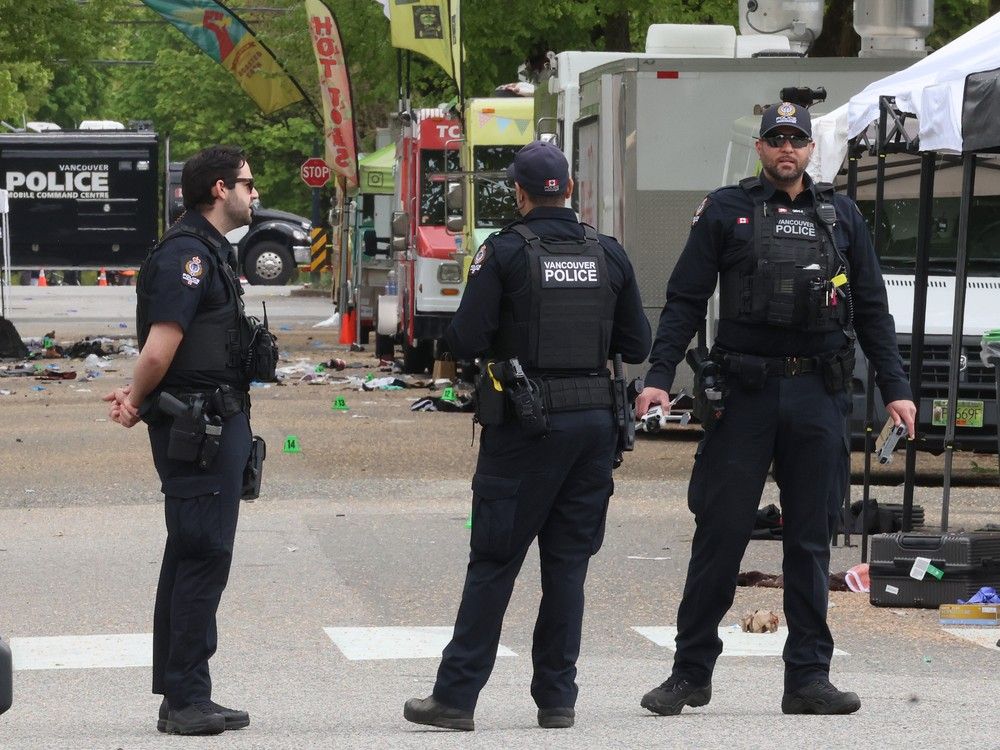
Accused mass murderer Kai-ji Adam Lo called Richmond RCMP the day before 11 people were killed at a Filipino street festival and claimed someone had thrown something into his SUV.
An officer talked to Lo on the phone just before 3 a.m. on Friday, but there was no further follow-up, a police source said. The Mountie then made an entry into a police computer system known as PRIME.
Sources said Lo was considered a “frequent flyer” who called police regularly about his fears people were doing things to him and to the black SUV that police say mowed people down at the Lapu Lapu Day festival just after 8 p.m. on Saturday.
He was on “extended release” from hospital and under the care of a mental-health team, Vancouver Coastal Health confirmed earlier.
Richmond RCMP Cpl. Adriana O’Malley wouldn’t comment on the interaction with Lo on Friday “due to privacy reasons.”
Vancouver police Sgt. Steve Addison said the VPD became aware of the April 25 interaction with police only after the killings. He said investigators ran the suspect’s name through the PRIME database and got a hit for the April 25 incident.
But he said earlier that Lo had many mental-health interactions with police before Saturday.
Dr. Bill MacEwan, a psychiatrist who works at the Surrey pre-trial jail, told Postmedia News that the volume of Lo’s calls and interactions with police and Lo’s apparent level of paranoia should have raised red flags for his mental-health team.
“The question is, ‘If they did see him, did they reassess how he was doing? Was he actually getting adequate treatment?’” MacEwan asked Wednesday. “If they were not following up and not hearing about these episodes and then taking them into account … the system is failing.”
MacEwan said mental-health teams meet regularly with those under their care in the community to ensure they’re taking medications and abiding by other release conditions. Meetings are usually more frequent if someone requires extra monitoring, he said.
Even if Lo, a diagnosed schizophrenic, was on his medication, “the degree of paranoia is not something that should be ignored,” MacEwan said.
Vancouver police wouldn’t provide more details Wednesday about the mental-health-related interactions they had with Lo. The east Vancouver resident is facing eight counts of second-degree murder, but more charges are anticipated.
Postmedia reported Sunday that Lo’s spiralling mental health led a family member to contact a psychiatric facility hours before the deadly rampage.
Vancouver Coastal Health said in its statement that there was no prior sign that Lo was “a public safety risk.”
Vancouver Mayor Ken Sim said Wednesday he’s working with community leaders to plan a public memorial for the Lapu Lapu victims that will be held in about two weeks. And he said he wants a provincial government commission into the vehicle attack to “deal with the very real mental-health crisis across B.C.”
He said learning Lo was under the care of a mental-health team and had been in hospital “is incredibly difficult to hear and even harder to accept, because it points to a deeper failure in the mental-health system.”
“I’ve said this before, and I will say it again, the mental-health crisis is not just a health crisis. It has become a public safety crisis.”
Interim Vancouver Police Chief Steve Rai agreed, adding “the system needs to be strengthened and expanded. We need a comprehensive system. The police are only one pillar of a wider solution.”
He said while the vast majority of people with mental illness aren’t violent, “it’s that gap in the system with the most violent indicators that we have to ensure all the resources are there to help someone in crises.”
Neither police nor health-care officials would comment on whether Lo was supposed to be driving the vehicle he co-owned with his mother Lisa, given his fragile mental state. ICBC didn’t respond to Postmedia’s request for information.
Premier David Eby announced that the province has declared Friday as a day of mourning to remember those lost and injured in the mass murder. And he also announced there would be a review and modernization of the Mental Health Act.
“What we are hearing from British Columbians is that we need to accelerate that work and that is what we are doing,” Eby said.
But he also urged people not to assume the mental-health system failed in the Lo case.
“Before we throw a care team under the bus, before we say that they did something wrong, failing to identify some kind of issue, let’s make sure that that’s actually the case,” Eby said. “I ask people to reserve judgment and not speculate until we know. We will get the answers.”
Bluesky.com @kimbolan.bsky.social